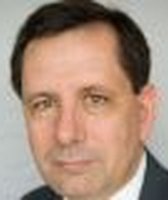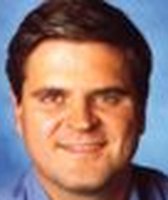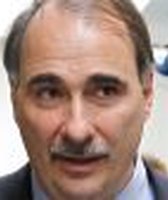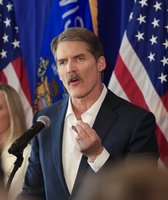Get PolitiFact in your inbox.
SUMMARY: John McCain's birthplace has given rise to one of the more vexing questions of the campaign season: If McCain wasn't physically born in the United States, can he be president?
In a folksy Mother's Day television ad, Sen. John McCain sits across from his mother, Roberta McCain, discussing his birth.
Roberta McCain recalls that it was a Saturday when she told her husband, Navy officer John S. McCain Jr., "We're going to have this baby!"
She relates what is clearly a well-worn anecdote, that the future presidential candidate was born about noon and "the club was very close by" and "I'm told that on the table, there were 27 bottles of scotch, all presents to Johnny."
There's no mention of where this all took place. And that's probably no accident. John Sidney McCain III was born Aug. 29, 1936, in the Panama Canal Zone, where his father, a Navy officer, was stationed.
If McCain is elected president, he'd be the first born outside the 50 states.
But there's more than trivia at play. McCain's birthplace has given rise to one of the more vexing and inconvenient questions of the campaign season: If McCain wasn't physically born in the United States, can he be president?
Ultimately, the issue is rooted in legal opinions (albeit some stronger than others), not facts, and so PolitiFact's customary True-False ratings don't quite fit here. Speculation about how the Supreme Court might rule would be just that. But as the issue has been much discussed and argued, we thought it would be worthwhile to lay out some of the facts behind the main arguments.
Article II of the constitution states: "No person except a natural born citizen ... shall be eligible to the Office of President."
The framers of the constitution didn't define "natural born citizen." The phrase was added without any clarifying debate. The Supreme Court has never been asked to definitively settle the issue. And so we are left with a phrase just ambiguous enough to cause controversy.
Google McCain and "natural born citizen" and you get 70,000 hits. In the Web pages, legal scholars — and those who just play them on the Internet — debate the nuances of such things as naturalized citizens versus natural born ones.
But is this simply a curiosity or is it a legitimate issue?
"I do think it's a legitimate issue," said Sarah H. Duggin, an associate professor of law at Catholic University who has written about and studied the issue extensively.
Duggin doesn't envision a scenario where McCain would be asked to step aside. Even if the Supreme Court was asked to weigh in, there are many strong legal arguments in McCain's favor. His father was serving in the U.S. military in a territory controlled at the time by the United States. You can choose from a veritable banquet of legal arguments to defend McCain, Duggin said, and the odds would be heavily in his favor.
"That being said, it isn't a sure thing," Duggin said. "No one can say conclusively what the answer is here."
Asked about the issue on his campaign plane in February, McCain dismissed it as already decided when Barry Goldwater ran for president.
"Barry Goldwater was born (in 1909) in Arizona when it was a territory, Arizona was a territory, and it went all the way to the Supreme Court," McCain said. "And there's no doubt about that. And it was researched again in 2000."
What McCain fails to note is that the Supreme Court never ruled on the Goldwater case.
While McCain and his campaign staff are confident this is a non-issue, the campaign was apparently concerned enough to commission a bipartisan pair of legal scholars, Theodore B. Olson and Laurence H. Tribe, to research the issue
Their conclusion: "Based on the original meaning of the Constitution, the Framers' intentions, and subsequent legal and historical precedent, Senator McCain's birth to parents who were U.S. citizens, serving on a U.S. military base in the Panama Canal Zone in 1936, makes him a 'natural born citizen' within the meaning of the Constitution."
Tribe, a professor at Harvard Law School, told PolitiFact the issue is clear. McCain meets the requirements for "natural born citizen" on two fronts, he said.
First, both his parents are U.S. citizens. The First Congress in 1790 established that children of U.S. citizens "born beyond the sea or out of the limits of the United States, shall be considered as natural born citizens."
(Duggin notes, however, that this language mysteriously disappeared from future versions of the Immigration and Naturalization Act)
Secondly, Tribe said, McCain was born in the Panama Canal Zone, a sovereign U.S. territory at the time of McCain's birth.
"Either of them would suffice to make him a natural born citizen," Tribe said. "Both together make it a clear case."
Some Internet bloggers have speculated that McCain wasn't actually born in the Coco Solo military hospital in the Panama Canal Zone, but rather a nearby off-base hospital, in Panama.
Contrary to some jokesters who say McCain is so old his birth certificate is expired, McCain does in fact have one. He's just not releasing it publicly.
But the McCain campaign did let a Washington Post reporter take a peek at it. According to the reporter, the certificate records his birth in the Coco Solo "family hospital."
According to Tribe, it wouldn't matter even if he was born in Panama.
It should be noted that Tribe acts as an informal adviser to Sen. Barack Obama's campaign. Obama was once a research assistant for Tribe at Harvard.
Tribe and Olson note that Obama was born in Hawaii in 1961, two years after its admission to the Union.
"We find it inconceivable that Senator Obama would have been ineligible for the presidency had he been born two years earlier," they wrote.
Obama and Sen. Hillary Clinton co-sponsored Senate legislation saying they thought the issue was bogus. On April 30, 2008, the U.S. Senate passed a resolution to put it to rest: "John Sidney McCain, III, is a `natural born Citizen' under Article II, Section 1, of the Constitution of the United States."
Case closed?
Not so fast.
Congress' interpretation is not binding on the courts, said Jill Pryor, who 20 years ago wrote a 19-page paper on the natural-born issue for the Yale Law Journal.
"It may be that as a political issue, no one wants to touch this with a 10-foot pole," said Pryor, now an attorney in Atlanta. "But that doesn't mean it isn't an issue."
In her paper, Pryor concluded that if the eligibility of a presidential candidate born outside the United States were challenged on the natural born citizen clause "the outcome, based on traditional methods approaching the clause, would be unpredictable and unsatisfactory."
Most legal scholars agree the wording would clearly prohibit California Gov. Arnold Schwarzenegger, who was born a citizen of Austria and became a naturalized citizen of the Unites States as an adult, from seeking the presidency. But it is less clear how the wording would effect, say, someone born outside the country to one American parent, or any number of other potential scenarios.
The source of the wording is believed to originate with a letter from John Jay to George Washington:
"Permit me to hint, whether it would not be wise...to provide a strong check to the admission of Foreigners into the administration of our national Government; and to declare expressly that the Command in chief of the american army shall not be given to, nor devolve on, any but a natural born Citizen."
Jay's idea, said Pryor, was to assuage fears that in a vulnerable new country, a foreign prince might be asked to serve as president of the United States. But that hardly settles the matter.
Duggin is convinced the issue will come up again and again until it is rectified with a constitutional amendment.
McCain and Goldwater are not the only ones to have faced questions.
Mitt Romney's father George Romney, who ran in 1968, was born in Mexico (to American parents), and former Sen. Lowell P. Weicker Jr. was born in Paris.
While the natural born question arose in all these cases, the Supreme Court never weighed in on it.
This time, it may.
After reading a news story about the controversy, Bill Aames, a worker's comp attorney in Riverside, Ca., filed a federal lawsuit March 6, 2008, in California saying an "actual controversy exists" and asking the courts to clarify the natural born issue.
But Aames quickly buckled after getting a letter from an attorney with the California GOP who called his lawsuit frivolous and warned that if he didn't drop the California Republican Party from the suit, he would seek sanctions against Aames and attorneys fees.
Aames, a registered Republican (though a one-time Democrat), said he had a change of heart.
"The main thing is that I have no political, ideological or financial incentive to push forward," he said.
He has no beef with McCain, and didn't want to be a "pebble in his shoe." He hasn't even decided who he will vote for.
But others have emerged. Fred Hollander, a computer programmer, filed a federal lawsuit March 18, 2008, in New Hampshire claiming McCain is not a natural born citizen, and therefore is not eligible to be president. Hollander has said he actually supports McCain, but filed the suit to settle the issue now, so Democrats can't try to overturn McCain's election if he wins.
Duggin doubts the courts will deem any of these random Americans to have standing to bring the suits. So who would? Any one of McCain's Republican opponents in the primary. So, probably, would his eventual Democratic opponent in the general election. None seems likely to file an objection.
"My guess is no one wants to take this all the way through," Duggin said.
In other words, the issue isn't likely to come before the Supreme Court this time either. And even if it did, most legal scholars say McCain would have little to worry about.
For his part, McCain falls back on a common sense, fairness argument.
The idea that "an American born in a territory of the United States whose father is serving in the military would not be eligible for the presidency of the United States is certainly not something our founding fathers envisioned," McCain said.
Perhaps, said Duggin. But, she said, "it is impossible to figure out what the framers meant."
"This is one of the most deceptively simple, complex issues."
Our Sources
Wall Street Journal, "Clinton, Obama Agree: McCain's a 'Natural Born Citizen,' " by Ashby Jones, April 11, 2008
U.S. Federal Court, Central District of California, Andrew Aames and Inland Empire Voters vs. the United States of America
FindLaw, "The Pernicious 'Natural Born' Clause of the Constitution," by John. W. Dean, Oct. 8, 2004
NewsBusters, "Q. Is Panamanian born John McCain a 'Natural Born Citizen' of the United States?" by Britcom, Feb. 21, 2008
New York Times, "McCain's birthplace prompts queries about whether that rules him out," by Carl Hulse, Feb. 28, 2008
CBS News, "Lawyers Conclude McCain Is 'Natural Born,'" March 28, 2008
Washington Post, "Citizen McCain," by Michael Dobbs, May 2, 2008
Legal Analysis, "Legal analysis by Laurence H. Tribe and Theodore B. Olson," March 19, 2008
USA Today, "McCain: My citizenship not an issue"
U.S. Code Collection, "1403. Persons born in the Canal Zone or Republic of Panama on or after February 26, 1904"
FactCheck.org, "How can Panamanian-born McCain be elected president?"
U.S. Constitution, "U.S. Constitution - Article 2 Section 1"
First Congress, First Congress, Session II, Chapter 4
Washington Post, "Fred Hollander vs. Sen. John McCain and Republican National Committee," April 1, 2008
Washington Post, "Panama American - McCain Birth Announcement," Aug, 31, 1936
State Department Manual on U.S. Citizenship, "Acquisition and retention of U.S. Citizenship and Nationality"
Interview with Jill Pryor, an Atlanta attorney, May 8, 2008
Interview with Laurence H. Tribe, a professor at Harvard Law School, May 8, 2008
Interview with Bill Aames, a worker's comp attorney in Riverside, Ca., May 8, 2008
Interview with Sarah H. Duggin, an associate professor of law at Catholic University, May, 12, 2008














































